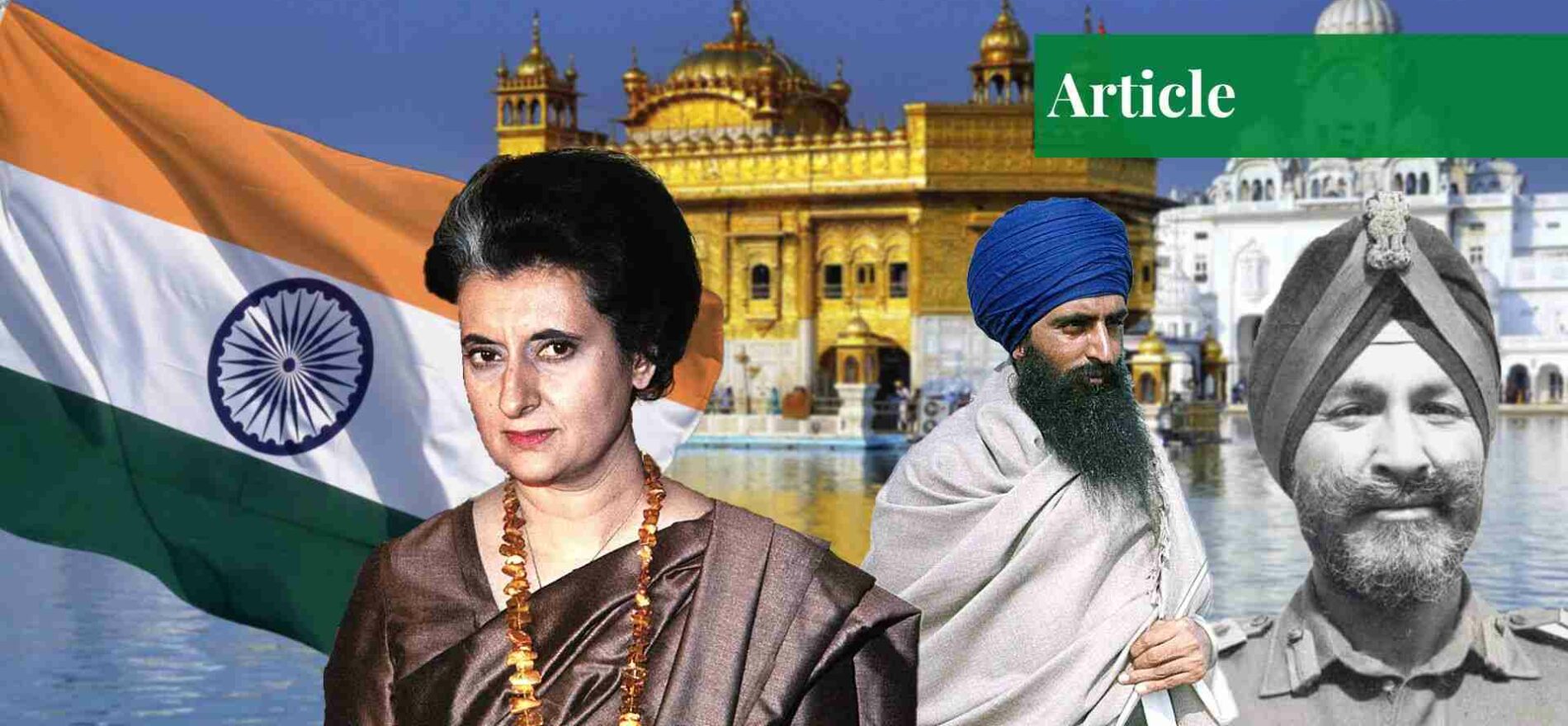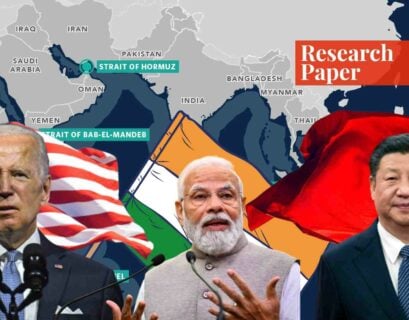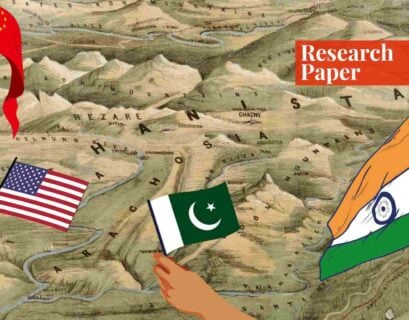Significant Event in Indian History
Operation Blue Star was a military operation conducted by the Indian Army in Gurdwara Sri Harmandir Sahib, popularly known as Golden Temple in Amritsar, with the objective of suppressing a suspected secessionist movement launched by Jarnail Singh Bhindranwale. Jarnail Singh Bhindranwale was a prominent Sikh with aspirations to pass the Anandpur Resolution and gain equal opportunity and treatment for the Sikhs. The Anandpur Resolution demanded a separate constitution for the state of Punjab.
Despite the fact that the resolution endowed the Indian government with substantial power with respect to the internal affairs of the autonomic province if the plan materialized, the Indian government recognized Bhindranwale and his followers as insurgents.
As the Sikh militants sought refuge in the Golden Temple, from where they also operated a parallel government, Indira Gandhi approved an operation to remove Bhindranwale and his followers from the holy shrine. There are several key figures who played pivotal roles in Operation Blue Star. Major General Shabaig Singh and Jarnail Singh Bhindranwale are two such individuals who sacrificed their lives for the Sikh community.
Major General Shabaig Singh
Major General Shabaig Singh was initially a member of the Indian army. He served in the Indian army until his retirement and fought in several wars including World War II and the War of 1971. However, he was refused his lifetime pension on the basis that he was ostensibly involved in corruption.
Shabaig decided to join Bhindranwale and his group after the ignominy, and he provided the group with expertise on how to fortify the Golden Temple, which would hinder the Indian army from seamlessly entering the compound. The knowledge and expertise he had gained over the years in the army allowed him insight into fending against enemies. This is also the reason why the Operation lasted for 10 consecutive days.
Jarnail Singh Bhindranwale
Jarnail Singh Bhindranwale, who also played a pivotal role in Operation Blue Star, was a staunch proponent of the Khalistan movement and the leader of the Damdami Taksal, an orthodox Sikh cultural and educational organization. The group supported a separate homeland and considered Sikhs a separate and distinct ‘qaum’. Bhindranwale, as head of the organization, openly expressed his views with regard to the suppression of Sikhs in India.
He advocated for the impartial and fair treatment of Sikhs. Loathing the attitude of the government towards Sikhs in India, Bhindranwale and his group established a government of their own with headquarters in the Golden Temple in 1982, from which they settled disputes and cases. The purpose of this initiative was to address the grievances of the constituents of Punjab.
Tragic Unfolding of the Golden Temple Assault
The separatist movement and activities centered around this idea continued with full momentum until 1984. The Indian government remained silent on the issue until 1984 when they ultimately condemned Bhindranwale and his group’s conduct and decided to pursue action two years later. Moreover, the state of India declared Bhindranwale and his followers as terrorists.
Indira Gandhi approved an operation to remove the ‘militants’ from the holy shrine in 1984. The Indian security forces assessed the training of the militants and their hideouts inside the temple. According to the eyewitnesses, the Indian security forces riddled the shrine with bullets and killed a total of 3 pilgrims on the first day of the operation.
During the next couple of days until June 4th, all exits from Amritsar were sealed along with the borders of Kashmir and neighboring regions. Moreover, all possible mediums of communication and public transport were suspended in Punjab for 36 hours from June 3rd. However, during this time duration, pilgrims were still allowed into the Golden Temple.
Although the Indian government claims that they requested the pilgrims to immediately leave the temple on June 4, 1984, Judge Gurbir Singh contended in 2017 that no such provisions were provided. Thus, it is blatantly evident that the operation was a direct violation of human rights.
Moreover, Jarnail Bhindranwale and his group did not hide or flee from the scene. They remained in the Golden Temple and fought courageously. The operation ended on June 10th, 1984 with the death of hundreds of people including Bhindranwale and Shabaig.
The Aftermath of Operation Blue Star
The aftermath of the operation included the death of both Zail Singh, the president of India from 1982-1987, and Indira Gandhi, the prime minister at the time. The murders were acts of vengeance. Besides these two politicians, General Arun Shridhar Vaidya, the Chief of Army Staff who assisted in the organization of Operation Blue Star, was also assassinated in 1986 by two Sikhs, Harjinder Singh Jinda and Sukhdev Singh Sukha. Both were awarded a death sentence and martyred on 7 October 1992.
More than 554 Sikhs including innocent pilgrims were killed in the operation. The Indian government asserted that the high casualties were due to Sikhs using pilgrims as human shields when in reality the operation was conducted during a time when the holy shrine was packed to capacity. Moreover, the curfew imposed by the government prevented the pilgrims from leaving the Golden Temple. Those pilgrims who survived were detained and beaten with allegations of supporting the ‘militants’.
The purpose of the operation was to reduce rebellious elements from the state. Yet, violence and support for the Khalistan movement increased after Operation Blue Star. The Sikh community was appalled by the fact that the Indian security forces desecrated the holy shrine and martyred hundreds of pilgrims. To add insult to injury, the operation was conducted on a religious Sikh holiday: the martyrdom day of Guru Arjan Dev.
Watershed Moment in Indian History
This military operation brought about significant transformations in India’s political, social, and cultural spheres. It sparked a growing Sikh separatist movement, escalating levels of militancy and violence. Furthermore, the operation had political ramifications for the Indian National Congress in regions like Punjab, where a substantial Sikh population resided. It contributed to the escalation of Sikh militancy, resulting in an upsurge in terrorist activities.
Owing to the intelligence services’ inability to accurately assess the situation, there was a reevaluation of India’s security and intelligence infrastructure. These incidents strained intercommunity relations, widening religious and communal divides and diminishing trust among diverse groups. The conflict also left a profound impact on Punjab’s economy, hindering efforts to repair infrastructure and attract investors.
Continued Suppression of Minorities
With a complete disregard for both human rights and life, the Indian government continues to violate the human rights of minorities in the country. Kashmiris are experiencing a similar tragedy with no end in sight. In conclusion, Operation Blue Star was a devastating tragedy for the Sikh community. There was immense bloodshed and hundreds of lives were lost.
No amount of recompense can assuage the grief and agony experienced by the Sikhs. The grievances of minorities are still ignored and neglected. To this day, Sikhs continue to advocate for Khalistan.
If you want to submit your articles/research papers/book reviews, please check the Submissions page.
The views and opinions expressed in this article/paper are the author’s own and do not necessarily reflect the editorial position of Paradigm Shift.



















